News and Announcements
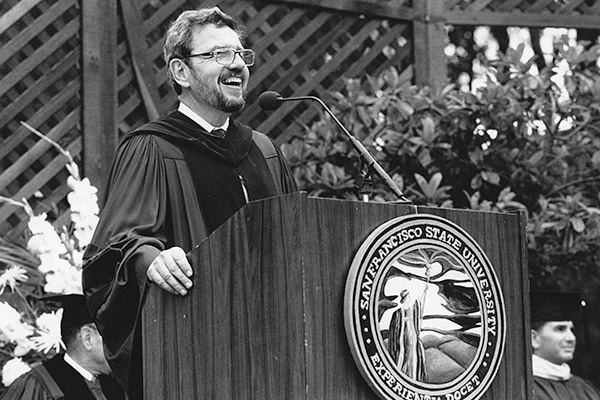
Robert A. Corrigan, who served as San Francisco State University’s 12th president from 1988 to 2012, passed away peacefully in his San Francisco home on July 5, 2024. He was 89 years old.
Corrigan started in the position during the summer of 1988 and was officially inaugurated as San Francisco State’s president a few months later. Standing before students, staff and faculty at the time, he spoke of his bold vision for SFSU to become “a different kind of public university, one that is organized around the concept of urban partnership” with faculty members who view the surrounding “city as their classroom.”
“President Corrigan was a national leader in promoting the cause of civic engagement in higher education and reimagining the modern, urban university,” current SFSU President Lynn Mahoney said. “Our campus owes him a debt of gratitude for his lasting and impactful contributions to our incredible university and students past, present and future.”
During Corrigan’s presidency, SFSU achieved many milestones that brought his vision to life. By the time he retired in 2012, there were more than 500 service-learning courses and dozens of University institutes and initiatives that linked the classroom and community.
SFSU also earned national recognition for its approach to education, including a designation as a Princeton Review “College with a Conscience.” The University also earned the highest federal recognition possible for its commitment to community service, a Presidential Award in President Obama’s Higher Education Community Service Honor Roll.
Corrigan also made significant progress on another goal: to work with the city and its local school system to change the conditions which have put so many urban students at educational risk. Throughout his presidency, he worked to create a pathway to college for all students, regardless of their backgrounds.
In the late 1990s, Corrigan oversaw the placement of college tutors in K – 12 classrooms nationwide when he chaired President Clinton’s Steering Committee of College and University Presidents for two initiatives: America Reads and America Counts, which focused on improving reading comprehension and mathematical skills, respectively.
In 2001, Corrigan extended the campus’ reach to the educational needs of nearly 2,000 low-income children when SFSU assumed management of San Francisco’s Head Start program, which focused on helping young children from low-income families prepare to succeed in school through local programs.
Corrigan was also a strong advocate for social justice and diversity, equity and inclusion, which were key priorities during his presidency. “That is our brand,” Corrigan said, “and it is one we are proud to own.”
“President Corrigan set for SF State the lofty mission of equity and social justice at a time when emphasis on these ideals was unheard of in most academic institutions,” said Academic Senate Chair Mike Goldman, who was a faculty member during Corrigan’s tenure. “At the same time, he never wavered from his love of the life of the mind and his pride in teaching, learning and research that would allow faculty members, as individuals, to know something that no one else in the world knew until they published their findings.”
In his inauguration speech, Corrigan called for the hiring and retention of faculty reflective of the diversity of the student population. Under his leadership, the University recruited and hired 1,000 new tenured/tenure-track faculty from 1989 to 2012 when he retired. This led to a tenured/tenure-track faculty pool that was 48% women and 37% people of color by the time he passed the torch to the next president.
“Succeeding Dr. Corrigan was an honor for me. His leadership over 20 years at SFSU and within the CSU system is a remarkable record in today’s world of university presidencies,” 13th SFSU President Leslie E. Wong said. “His help during my early days at SFSU was most helpful as I had lots to learn, and I respected every moment we shared.”
“I was always impressed at how he seemed to engage with faculty,” said SFSU Dean of the Division of Graduate Studies and Career Development Sophie Clavier, who was a faculty member during Corrigan’s presidency. “I remember more specifically a time when I was either still a lecturer or just brand new assistant professor — in any case quite junior — and at an event he told me that he ran across some alumni who were mentioning classes they took with me. He took the time to acknowledge me and made me feel quite special.”
Before his presidency at SFSU, Corrigan served nine years as chancellor of the University of Massachusetts at Boston. He received his A.B. from Brown University and both his master’s and doctoral degrees in American Civilization from the University of Pennsylvania.
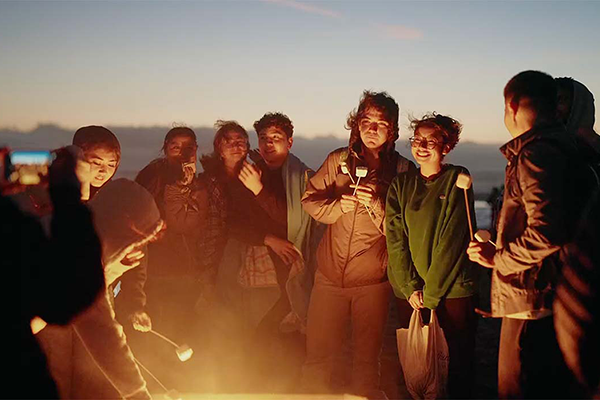
Starting at a new school can be simultaneously exciting and nerve-racking, especially when that school is in a big, vibrant city like San Francisco. That’s why SF State hosts its annual GatorFest! celebration, which welcomes new Gators while helping them prepare for the adventure ahead. Over the first few weeks of the academic year, dozens of events introduce new students to their peers, SF State’s campus and the city.
“As an international student, the events at the beginning of the semester were invaluable in helping me learn more about the campus. They made me feel welcome and motivated me to start classes with enthusiasm and energy,” Computer Science senior Leonardo Meza Martinez said.
Events run from August through October, with festivities kicking off with Gator family receptions 5 p.m. Tuesday, Aug. 20, and Wednesday, Aug. 21, at Don Nasser Family Plaza. This month alone, GatorFest! events include movie nights, an ice cream social, glow-in-the-dark hide and seek, a city tour and much more. There’s even an Ikea trip — perfect for new roommate bonding — and an SF Sketchfest comedy improv show by SFSU alumni.
“As a third-year transfer student who transferred here last fall, GatorFest! provided me with endless opportunities to get engaged, be involved and meet new people. I am so appreciative of SFSU taking the time to put on events such as these because it truly encompasses such a wonderful sense of community and belonging within our campus and within our students,” said Hannah Johnson, who studies psychology and creative writing. “I was petrified starting my first semester here, but I’m beyond grateful for events such as GatorFest! that encouraged me to step out of my comfort zone and put myself out there.”
Check the GatorFest! web page, the University Calendar or GatorXperience for updated info about these events and more. Learn more from SFSU’s New Student & Family Programs.
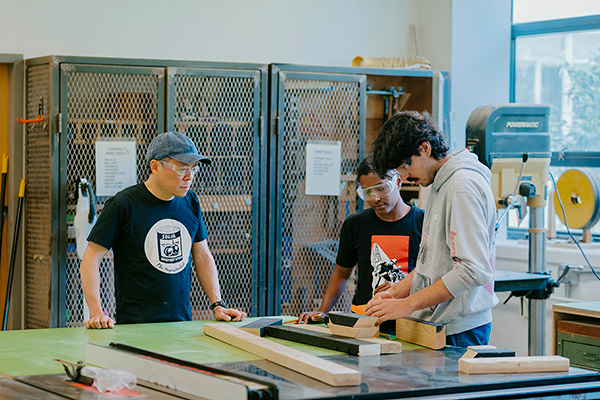
For the past year, Art students at SF State set aside their easels and learned the trade-skills aspects of the art world. A pilot program in Art Handling teaches students the proper ways to handle art and prepare them for careers in museums, galleries, auction houses and beyond. The 12-unit program is among the first of its kind at a public university, training students in a field where no academic degree program exists, anywhere.
Students have found themselves driving a forklift, riding a scissor shift, drilling wooden cleats into walls of the Fine Arts Gallery on campus and more. The experience they’ve gained since beginning the program last fall has already landed them work at venues such as the de Young Museum, Contemporary Jewish Museum and California Institute of Integral Studies. Many of the 15 students in the pilot program had never even heard of art handling.
“This program has been transformational,” said Adrian Morelock-Revon, a sculptor who graduated with a bachelor’s degree in Art History this year. “I was goal-less coming back to university. Now I have more direction.”
For Public Health major Megan Rogers (B.S., ’24), the Art Handling program has introduced her to new community.
“I took a ceramics class and fell in love (before enrolling in Art Handling),” Rogers said. “This has been a really big confidence boost. It has been wonderful to connect with like-minded students.”
Other students in the cohort have made discoveries both practical and symbiotic.
“I’m much nicer to my own artwork now, especially storing it,” said Emma Purves, a multidisciplinary artist, as she and two classmates wrapped sculptures from the most recent Fine Arts Gallery exhibition. “I used to keep it in a pile without thinking about long-term damage.”
Valerie Mata, who completed a bachelor’s degree in Studio Art this year, has found that there is much more to art handling than hanging, packing and shipping.
“I’ve gained a strong idea of my environment and community, delving into this portion of the art world with people closer to my age and getting into the museum world and curatorial projects,” she said. “We see a different side. It gives me continuous learning.”
Art handling is a mid-level position secured through on-the-job training, word of mouth and unpaid internships, which is not economically feasible for most SF State students, as stated in the grant proposal that was funded by the CSU Creating Responsive, Equitable, Active Teaching and Engagement (CREATE) Awards Program. It was the only arts-based program to win a CREATE award for 2023 – 2024. The program also aims to diversify the field of art handling. The overall workforce is more than three-fourths white and male, according to data compiled by the Broad Museum.
“A program like this really does open the diversity in this industry. By happenstance or not, the industry is really white and male dominated,” said Kurt Otis (B.A., ’18), one of two alumni tapped by the School of Art to mentor students. He is the lead art handler for the Minnesota Street Project’s Art Services department in San Francisco. “The semester is a short time, but my mentorship with the students truly lasts longer. I told them, ‘You have my phone number. You have my email. ... Let me help you transition into the professional world and even beyond.’”
The other mentor, San Francisco Museum of Modern Art Preparator Ximaps Dong (B.A., ’19), has shown students how they install artwork in their job as well as for friends at neighborhood galleries.
“I’m able to use the resources and my community to help students out,” Dong said. “And also, just like, make it approachable because I feel like the art world can be a little scary and foreign.”
“We want to create those network connections now,” said Art Lecturer Kevin B. Chen, who directs the program with SF State Fine Arts Gallery Director Sharon E. Bliss. “If we can help restructure the network, we can help diversify it.”
“We’ve also gotten incredible feedback from institutions. They’re saying that they’ve been waiting for something like this,” Bliss said. “The word is getting out and folks are just like, ‘How do we support you? How do we get these trained students into our workforce?”
The students finish their program with a culminating exhibition that they installed themselves. “Waters Run Deep” is on display through Saturday, Sept. 7, in the Fine Arts Gallery in the Fine Arts building. Admission is free.
Learn more about the SF State School of Art.
Photo by Juan Montes
SF State has received a $100,000 grant from the National Park Service to assist in the consultation and documentation of ancestral remains and cultural items, as part of the Native American Graves Protection and Repatriation Act (NAGPRA).
SF State is one of two California universities to receive a grant, among 13 tribes and 21 museums nationwide.
On Tuesday, Aug. 20, and Wednesday, Aug. 21, the campus will welcome new residents to the housing community for the 2024 – 2025 academic year. In preparation for their arrival, please be aware that there will be higher than normal traffic congestion in and around the campus perimeter (particularly State Drive, Lake Merced Boulevard and Holloway Avenue). In addition, Lot 19 and Lot 20 (floors 1 – 3 and top floor) and some street parking may be restricted.
You can now customize your SF State Gateway LaunchPad (the screen you see when you log in) to choose the new Gateway apps you use most. Check it out by clicking the wheel cog at the top right of the LaunchPad area or in “See all apps.” Make changes that suit your needs as a faculty or staff member.
Other enhancements to SF State Gateway include a “What’s New” feature that will alert users about new features with a dismissible popup. All new Gateway features will continue to be found under the question mark.
As part of SF State’s commitment to maintaining the highest standards of data security, all employees should review the SF State Payment Card Industry Data Security Standards (PCI) policy. The policy is to ensure that all campus entities that require payments are consistent, efficient and secure as they protect the interests of the University, its auxiliaries and individuals, including students, employees and organizations doing business with the University and its auxiliaries. This policy provides requirements and guidance to ensure that payment card acceptance and e-commerce processes comply with the PCI Data Security Standards requirements.
For questions, clarification or to ensure you are on the list of approved locations, please email the PCI Committee at pci@sfsu.edu.
Academic Technology (AT) will begin extended hours starting Monday, Aug. 26.
Fall support hours:
- Mondays – Thursdays:, 8 a.m. – 8 p.m.
- Fridays, 8 a.m. – 5 p.m.
Visit AT in Library 80, call (415) 405-5555 or email at@sfsu.edu.
For more start-of-semester assistance from AT, view the Get Ready for fall 2024 page.
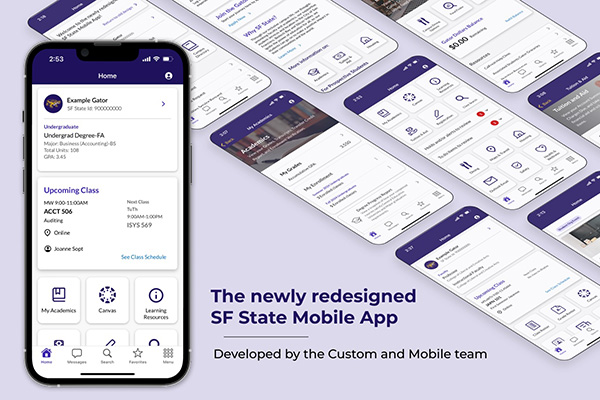
Information Technology Services (ITS) is pleased to announce the release of a new, streamlined SF State mobile app interface. Students and faculty will find their class schedules at the top of the screen, with access to building locations and information on their various instructors’ contacts. Users can also view financial aid information, grades, account summaries and more with a single login.
The new and old interfaces will be available simultaneously for the first month, allowing users to switch back to the old interface as they wish. The SF State community is encouraged to use the app’s feedback feature to communicate suggestions for improving their mobile app experience.
Interested in a cultural exchange? Want to practice your foreign language skills? The American Language Institute (ALI) is for speakers of English who wish to be matched with an international student for an hour a week of informal conversation.
The American Language Institute is an intensive, four-to-six hour per day English Language Program on campus. Most of the ALI students are eager to learn about American culture and to practice their English. Volunteers can often “trade” languages (e.g. 30 minutes of English, 30 minutes of Chinese). A get-together for all volunteers and students to meet one another will take place at a date and time to be determined.
Program matches are on a first-come, first-serve basis so please apply as soon as possible. For questions, please email Trang Tran.
Applications for the 2024 – 2025 College Corps program are now available to students interested in giving back to their community while graduating with less debt. Students have the opportunity to earn up to $10,000 over the course of the academic year.
Fellowship applications are due on a rolling basis; interviews are provided on a first-come, first-serve basis. This program is open to all undergraduate students, including those receiving the California Nonresident Tuition Exemption (AB 540).
College Corps is an AmeriCorps program that engages 65 students from SFSU through this paid fellowship that allows for students to expand their professional development skills, while learning alongside community members. Students will be placed in nonprofits within the San Francisco community in three focus areas: K – 12 education, climate action and food insecurity.
Unlike other fellowships, internships and volunteer programs, College Corps fellows work directly with communities in San Francisco that need like-minded individuals interested in making a change. All fellows will participate in an orientation and training with the program and their assigned host site supervisors.
For questions, please email Meagan Prasad, College Corps program lead. For general questions please email collegecorps@sfsu.edu.
The University’s Opening Convocation is Thursday, Aug. 22, 9:30 – 11:30 a.m., in McKenna Theatre, Creative Arts building.
Beginning at 8:15 a.m., connect with your colleagues, enjoy coffee and bagels at the Creative Arts entrance on Holloway Avenue and learn about resources in Creative Arts 153 and 154. At Convocation, distinguished faculty and staff awards will be announced and new faculty will be introduced.
If you are unable to attend in person, a live stream will be gavailable on the Academic Senate website.
Join Risk and Safety Services to learn more about Free Speech, Time, Place and Manner policies which will include guidelines for tabling and signage on campus. The presentation will take place Wednesday, Sept. 11, noon – 1 p.m., in Mashouf Wellness Center, classroom 105.
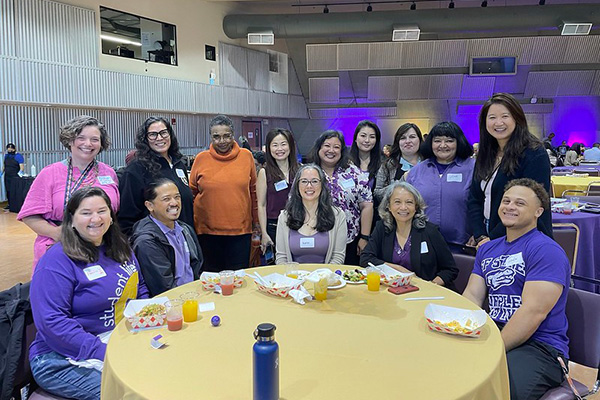
Are you a Gator² (alumni who are also staff or faculty)? The Alumni Association invites our Gators² to the 2024 Campus Staff & Faculty Alumni Luncheon on Wednesday, Oct. 9, 11:30 a.m. – 1 p.m., on the fifth-floor patio of the Administration building. It’s a chance to connect with colleagues who are also Gators and learn about what’s new on campus.
Admission is free but registration is required. The deadline to register is Wednesday, Oct. 2, 8 a.m.
For questions, please email Marciana Flores.
SF State welcomes persons with disabilities and will provide reasonable accommodations upon request. For reasonable accommodations for this event, please email Marciana Flores on Wednesday, Sept. 25, by 8 a.m. to allow time for your request to be reviewed.
Campus Safety Week is a campus-wide effort to raise awareness about personal safety and the resources available for promoting health and safety in our personal and occupational environments. Join Environment, Health and Safety from Monday, Oct. 14, to Friday, Oct. 18, with Campus Safety tabling day on Wednesday, Oct.16, for a week full of fun and informative trainings. Visit the Environment, Health and Safety website for more updates.
SF State Spotlight
Numerous SF State faculty and students are part of the new book “Advancing Equity and Inclusion in Early Childhood” (IGI Global). The book’s editors are Associate Professor of Special Education Maryssa K. Mitsch, Professor of Special Education Amber Friesen and Special Education doctoral student Karina Du.
Other SF State contributors include Associate Professor of Elementary Education Maria Del Rosario Zavala, Assistant Professor of Special Education Mayumi Hagiwara, Assistant Professor of Social Work Erica Bosque and six students from the joint doctoral program in Special Education with University of California, Berkeley, including Du, Sara Burton Ucar, Jaqueline Anton, Prince Estanislao, John Kim and Hadas Arbit.
“We are hopeful that this work contributes to the growing amount of voices seeking meaningful, high-quality, equitable and inclusive opportunities for young children, their families, and the communities they live within,” Mitsch, Du and Friesen said.
For the past several years, Goodwill San Francisco Bay has partnered with the Apparel Design and Merchandising program on projects around circular fashion and textile reuse. For their recent collaboration, Goodwill mentored six students and provided them with unsold clothing items from its retail channels. The students took these items and reimagined them, giving them a second life as a festival-wear collection. Each student applied their own unique design sensibilities, creating innovative garments that go beyond typical upcycling.
The full collection of student garments was showcased on mannequins at the Goodwill store on Haight Street in San Francisco from July 31 to Aug. 12.
The students started their design project with a tour of Goodwill’s South San Francisco warehouse. They had the opportunity to see how Goodwill processes millions of garments every year, giving them a new life via donation collection and resale channels. They learned more about Goodwill’s role in the circular fashion economy and how the rise of fast fashion poses new challenges. With their recycled garments in hand, they got to work transforming them into something new and future-thinking. During the process they received input from Goodwill’s visual merchandising team, mentoring them on their designs and showing them how to elevate them for in-store display.
Visit the Goodwill San Francisco Bay website to read the full story.
The Office of Strategic Marketing and Communications won a silver medal in the Council for the Advancement and Support of Education’s 2024 Circle of Excellence Awards. A video produced for the CSU Board of Trustees, “The Culture of Possibility,” won in the category for long promotional videos.
Videographer Juan Montes directed the video. Marketing and Brand Strategy Director Barbara Stein led members of the Office of Strategic Marketing and Communications staff to help Montes identify an approach to the video and tackle the logistical challenges of producing it.
“Beautiful visuals, exceptional sound design and a unique editing style, all contributing to a modern and innovative approach,” the judges commented. “The video expertly transitioned from quick cuts to slower segments. The story was moving and inspiring and aligned with the university’s pillars.”
Associate Professor of Africana Studies Mark Allan Davis and Dana King partnered with the San Francisco Recreation and Parks Department for “Monumental Reckoning.” The one-day live exhibit for Juneteenth featured 50 Black women, both cis and trans, as well as Black nonbinary people. The San Francisco Chronicle covered the event on June 20.
Davis is also published in the new anthology “Black Fire—This Time, Volume 2” (University Press of Mississippi).
Before the Supreme Court took its summer recess, it landed a series of tremendous blows on the administrative body that serves the public interest, according to Ernie Joaquin, associate professor of Public Affairs and Civic Engagement. Her recent essay for the PA Times urges citizens, educators and practitioners of public administration to consider the implications of the demise of judicial deference (Chevron doctrine) and related rulings that would constrain good government.
Joaquin portrays a litigious and chaotic future for agencies that regulate anything from nursing home care to environmental safety.
“The coming winters will feel acrimonious, given the uncertainties unleashed by the Roberts Court,” Joaquin wrote. “In higher ed, even as we confront similar deconstructions and divisions, we need to imagine the contours of administrative study and practice that must rise from the ashes post-Chevron.”
Professor of Design Hsiao-Yun Chu recently taught a short course on “Design and Society” to students at Sichuan University (SCU) in Chengdu, China, as part of SCU’s University Immersion Program. This intensive program invites faculty experts from around the world to offer thought-provoking courses to SCU students in support of academic, cultural and linguistic exchange.
Associate Professor of American Indian Studies Robert Keith Collins was an invited session guest speaker on research design at UC Berkeley’s Advanced Oral History Summer Institute on Aug. 8. This session centered on the dynamic nature of oral history research, difference and similarities between ethnographic and oral history approaches to life histories, and the relevance of person-centered ethnography to oral history research design.
Assistant Professor of Biology Archana Anand and her students published a new MDPI Foods article discussing the relationship between soil microbes and the taste and quality of wine (wine terroir). This is important because vineyards can play a role in carbon sequestration via healthy soil and microbial communities. Identifying knowledge gaps in the research literature, the team notes that more high-throughput omics could help understand microbes’ functions and mechanisms, and how they influence grape chemistry. Identifying how vineyard management and climate change effect soil microbiology can support sustainable viticulture and produce desired wine terroir traits.
This paper was led by undergraduate researcher Gabriela Franco along with her co-authors, including several other SF State students and Neely Winery. All of the student authors are under-represented minorities, and more than half of them are first-generation.
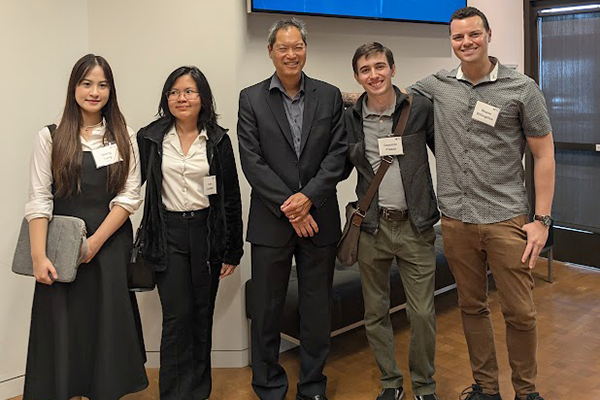
On July 18, the Asia Society hosted a panel discussion in San Francisco with past winners of its Game Changer West Awards, including Asian American Studies Professor Russell Jeung. At the event, Jeung met four SF State graduate students in International Relations, one of whom was an Asia Society intern.
Recreation, Parks, Tourism and Holistic Health Professor Erik Peper authored two articles for Townsend Letter:
- “Playful practices to enhance health with biofeedback” (July 13)
- “Improve vision: Interrupt your screen time and look at the distance” (July 27)
On Aug. 9, Biofeedback published “Increase attention, concentration and school performance with posture feedback” by Peper; Recreation, Parks, Tourism and Holistic Health Professor Richard Harvey and Recreation, Parks and Tourism Professor and Chair Erik Rosegard.
Peper and Julie Shuford authored “Reflections on the increase in autism, ADHD, anxiety and depression: Part 2 – Exposure to neurotoxins and ultraprocessed foods,” published in NeuroRegulation on June 27.
Criminal Justice Studies Lecturer James Dudley and Janay M. Gasparini wrote “Recruitment and Retention of Gen-Z Law Enforcement Officers” (Blue360 Media). The book delves into the dynamics of integrating Generation Z into law enforcement agencies. It includes a thorough examination of the generational characteristics and traits of Gen Z, their upbringing, educational backgrounds and how they operate within the workplace. The book offers actionable solutions for law enforcement leadership in the midst of a recruitment and retention crisis.
Professor Emeritus of Public Health Ramon Castellblanch was the lead presenter at a session of the 2024 California Department of Health Care Services Substance Use Disorder Integrated Care Conference held Aug. 13 – 15.
Per the National Opioids Settlement, the opioid industry has begun sending California a $4-billion series of payments that will continue until at least 2038. Per the settlement, the funds are for opioid remediation activities, such as distributing overdose reversal drugs and recovery treatment. California is distributing 85% of its settlement funds to local governments.
But local governments spending reports to the state are often vague and seldom provide dollar amounts for activities funded. Some of the activities listed in the settlement are not being funded in many localities.
Many localities have opioid safety coalitions that include frontline opioid remediation workers and relatives of opioid overdose victims. To help overdose prevention activists promote local spending more in accord with the settlement requirements, a session headed by Castellblanch presented activists with a draft opioid settlement spending report card.